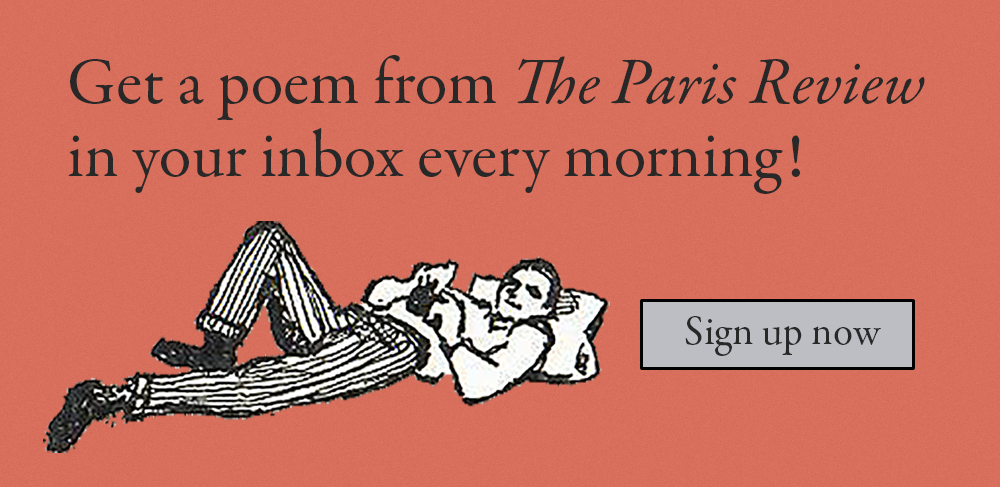In our column Poetry Rx, readers write in with a specific emotion, and our resident poets—Sarah Kay, Kaveh Akbar, and Claire Schwartz—take turns prescribing the perfect poems to match. This week, Claire Schwartz is on the line.
Dear Poets,
I recently got into a relationship with a wonderful, intelligent, caring man. I had been holding out on dating for a while, I was waiting for something to really click. Things are clicking with this person, but I am having a hard time deciphering if this is the kind of love I’ve been searching for. You know, the kind of love they write grand poems about. Maybe that type of love doesn’t exist, or maybe I am destined to be unsatisfied in matters of the heart. I know that love comes in many forms, but I can’t help being so afraid of ordinary love. Searching for a poem that offers insight into proving (or disproving) the old chestnut “when you know you know.”
Sincerely,
Defeatist Romantic
Dear Defeatist Romantic,
I always feel a little sad on my birthday. Even when the day is beautiful, ideas about time and progress converge into this nagging feeling that where I am is not exactly where I should be. But holding my life up to some nebulous standard doesn’t get me closer to anything I want; it only diminishes my ability to see the expanse where I already am. Questioning is crucial, reflection is important, but trafficking in lack can obscure the wide possibility your present offers. If you are always looking toward an elsewhere, you may one day arrive there without the capacity to recognize it.
For you, one of my all-time favorite poems, in which the speaker, his vision deepened by time, looks back at the gorgeous, ordinary labor of great love: Robert Hayden’s “Those Winter Sundays”:
Sundays too my father got up early
and put his clothes on in the blueblack cold,
then with cracked hands that ached
from labor in the weekday weather made
banked fires blaze. No one ever thanked him.
That “too” in the opening line undoes me. Such a small, unassuming word, carrying with it the week’s six work-filled days. The poet’s touch is humble, like the father who doesn’t parade his exhaustion, but instead rises early to warm the house for his family. I like to think of the “too”—that immaculate craft—as the speaker’s inheritance. The poem becomes possible when he relinquishes his ideas about what love should look like—ideas that precluded him from recognizing his father’s gestures.
Speaking indifferently to him,
who had driven out the cold
and polished my good shoes as well.
What did I know, what did I know
of love’s austere and lonely offices?
I can’t tell you whether this relationship with a wonderful, intelligent, caring man fills you in the ways you need, but I can tell you that you that by holding the love you have against a preconceived idea about what love should be, you risk missing the beautiful forms already in your life.
—CS
*
Dear Poet-on-Duty,
Two years ago, something terrible happened to me. It is something that happens to a lot of women my age who go off to college, in much worse ways to most of them than to me, and yet still—something terrible was done to me by someone I thought I trusted. I have spent these two years trying to recover, to heal, to find life and ambition and bravery again, and I see a therapist and take my meds and call my mother and go to bed early and I still feel like I have been marooned alone on the island of my leftover body.
There are poems and stories about rape, but the language always feels hollow or flat to me. The stories that end in anger and persistence and resistance don’t feel true. Justice did not happen, though I tried; I don’t feel a need to speak up any more than I have already done. The story did not get a perfect ending. I just want to know that there is, somewhere, someday, some ending for me that is good even if it is not beautiful. I wish I had a poem for this vast, weird sorrow that lives inside me, for feeling like I don’t know how to heal while all the time moving onward toward it anyway, and still having so very far to go.
Is there a poem for this?
With much love,
Still Stuck
Dear Still Stuck,
I’m sorry this happened to you, and I’m glad to know you’re seeking many forms of support. A poem works best, I think, in an ecosystem of care. Oh, how your letter resonated with me. Recently, I’ve been chafing against the word survivor when it’s been handed to me to name my own experience. Survivor feels like a narrative when what I need is a poem, riddled with silence and absence and not-knowing. It feels like survivor, when imposed, anxiously insists on the present’s triumph: you’re past that now, right? It can be lonely there, in that aftermath, even though people so often seem to want to deny it. I love that you’ve asked for a poem as company. I want to offer you George Abraham’s “Essay on Submission,” a poem filled with imperfect endings, which are, seen differently, beginnings that bring their pasts with them:
Having ebbed in the disbelief of it instead of its weight.
Stone-tiled the floor the blood a trickling fire confessional.
Here the ocean metaphor refused.
He tore me shut & seeping no vastness.
To marvel or hide in.
Sometimes, if you move past the period at the end of the line, past the blank space of the line-stanza break, cohesive sense returns. More often, meaning slips, proliferates. And isn’t that, actually, how it always was? The body can no longer sustain the fiction that it only gets better.
…histories like this cannot.
Be known let alone escaped even the one.
Where i set fire to my colonizer i can afford neither.
Reclamation nor reconciliation
No.
Unfragmented i cannot give you an ending.
There is no guarantee in these lines but, in the uncertainty, there is truth. And in truth, there is company. The end-stopped lines and ample white space dislodge standard ways of reading. When I read this poem aloud, my breath is hitched where the punctuation jars sense. Sometimes, something happens that ruptures the syntax of our living. Sometimes, there is no language there. Abraham’s poem has offered me an antidote to loneliness in that space. It hope it might offer you that, too.
—CS
*
Dear Poets,
Full disclosure: I am a bit odd. I admit it. I’m good with it. I am an only child and an introvert by nature. I love the house when it is quiet, when my daughters are in bed. I wake up in a fog of dreams and carry them with me as long as can, through the morning routine, through the school drop-off, through the drive to work, and even as the day starts and my boss is calling, I am still there, in the company of a great many imaginary friends.
My daughters are just as dreamy as I am, but they are also present and energetic and happy among their friends. I have to work at playdates and social events—the introvert in me groans a bit, but I know it is important. I want them to have what I never did: a tribe.
I do not have many friends, and the few good ones who love me, oddness and all, are at a geographical distance. I talked to my father the other night, and through the FaceTime flickers, he told me what I already know: that I am isolated. I would fix it if I could, if I knew how. My mind feels so fractured these days, and I have to fight for the quiet moments. It is more and more difficult for me to send pieces of myself into the world, since it never seems to go well. I have not done any of the things I dreamed of doing, and I have done other things I never imagined were possible. But there is a sadness that I cannot shake, and a loneliness. I am most at home in the company of books, but I know less about poetry. I would be grateful for any lines you can offer.
With much gratitude and much admiration,
A Bit Odd in Virginia
Dear A Bit Odd in Virginia,
You’ve come to the right place! Mary Ruefle writes: “It is the first experience you ever had of reading a decent poem: ‘Oh, somebody else is lonely, too!’ ”
I feel such kinship with you. I, too, find such joy in the imaginative space solitude grants. I cherish the title of Bob Kaufman’s poetry collection Solitudes Crowded with Loneliness because it reminds me that to be alone and to be lonely are not the same—though sometimes they overlap. But then, I am reminded that I do delight in a certain kind of company. Rainer Maria Rilke writes: “To know when you need to join in: that is the secret of your solitude: just as the art of true interactions with others is to let yourself fall away from high words into a single common melody.” You know now that you need to join in. That knowing is a gift your solitude has given you. What a rich inner life you’ve developed to offer the world.
For you, Dionisio Martínez’s “Flood: Years of Solitude:”
To the one who sets a second place at the table anyway.
To the one at the back of the empty bus.
To the ones who name each piece of stained glass projected on a white wall.To anyone convinced that a monologue is a conversation with the past.
To the one who loses with the deck he marked.
To those who are destined to inherit the meek.To us.
The poem is a toast and an address. The accumulation of solitudes have produced a gathering.
Keep going. You have the model of your daughters, the beauty of your efforts, and the unfolding gift of your lush interior life. If reaching out to others doesn’t “go well,” that’s just information. That’s okay. It’s practice, necessary searching. Be gentle with yourself. Keep trying. You will find your people.
—CS
Want more? Read earlier installments of Poetry Rx. Need your own poem? Write to us!
Claire Schwartz is the author of bound (Button Poetry, 2018). Her poetry has appeared in Apogee, Bennington Review, The Massachusetts Review, and Prairie Schooner, and her essays, reviews, and interviews have appeared in The Iowa Review, Los Angeles Review of Books, Virginia Quarterly Review, and elsewhere.
from The Paris Review https://ift.tt/2IHP35R


Comments
Post a Comment